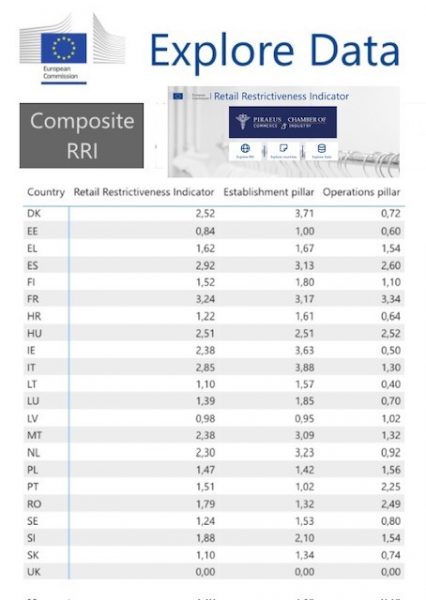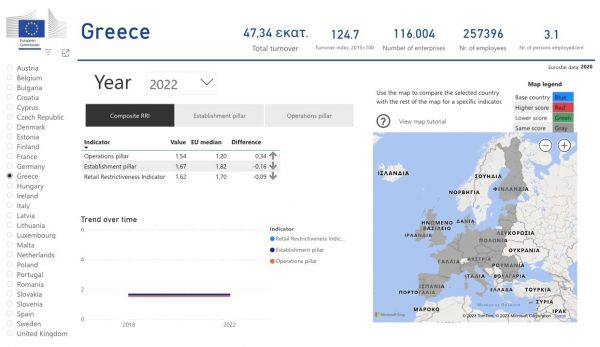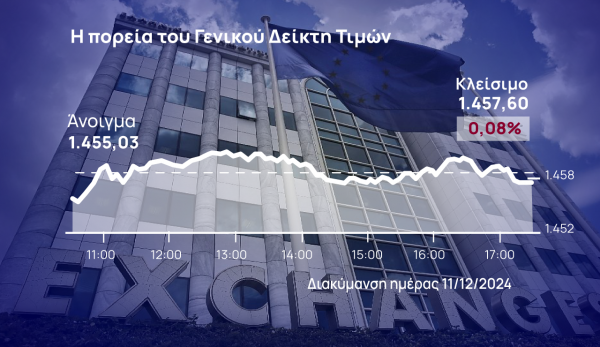
One of the most restricted sectors in the EU is retail trade, according to what the Piraeus Chamber of Commerce and Industry-EVEP reports in its announcement.
The EVEP informs that the RRI (Retail Restrictiveness Indicator) of the European Commission, which refers to the restrictions of retail trade, confirms that it is one of the most regulated business sectors in the EU.
The European organization EuroCommerce, which represents retail and wholesale trade in Europe, emphasizes that the retail environment has remained the same, or even worsened, since 2018, when the index was established.

Retail provides an essential service but faces a challenging environment with high inflation, while at the same time it needs to be able to support the EU’s digital, sustainability and skills goals.
The RRI provides a useful tool to indicate the constraints hindering the digital transformation, sustainability and long-term competitiveness of the commercial sector. The index mainly concerns restrictions for retail outlets, such as permits required to open stores and local operating restrictions specific to retail trade. There are obviously more rules that apply to retail, but these apply to other sectors as well.

Possibilities to reduce the regulatory burden
This means that there is huge potential to reduce the regulatory burden and increase competition and innovation in the commercial sector. There are 3.5 million retail businesses in Europe, i.e. 1 in 6 total businesses, providing 16.5 million jobs, especially for young people. EuroCommerce has chosen a different direction in recent years, preventing member states from imposing more legal requirements, political pressure and increased inspections across the EU. This way supermarkets will be able to reduce food prices, or keep them low. Reducing the burden of regulatory costs may be the answer according to a recent study published by EuroCommerce in collaboration with McKinsey, which shows that margins in food retailing have been reduced.
EuroCommerce therefore encourages the Commission, Member States and the European Parliament to use the RRI to assess how regulatory burdens in the sector can be reduced. This will boost competitiveness and innovation and offer more choice and affordability to consumers. This will also be a step forward in achieving the goals of increasing integration and reducing regulatory compliance set by the EU in its recent post-2030 communication.
The president of the E.V.E.P. and member of EuroCommerce, Vassilis Korkidis, stated that he agrees to discuss, within the framework of a Task Force, the enforcement of the single market (SMET), in order to contribute to the removal of barriers, as well as administrative costs in the commercial sector. It also welcomes the RRI’s reference in the European Semester Spring Country Reports and believes that the EU should consider expanding them in the future with country-specific recommendations asking Member States to remove unnecessary and unjustified barriers to retailers and wholesalers. In Greece, the index shows a significant improvement between 2018 and 2022, since it now fluctuates at better levels than the European average. The trade sector can therefore look to the RRI as a tool, which, during the transition period, will act as a road map for the retail and wholesale ecosystem in every EU market and certainly in the Greek one.
Latest News

EasyJet Expands Its Routes from Athens
The airline’s two new routes will be to London Luton and Alicante and they will commence in summer 2025.

Capital Link Forum Highlights Greece’s Economic Resurgence; Honors BoG Gov Stournaras
Capital Link Hellenic Leadership Award recipient, Bank of Greece Gov. Yannis Stournaras, an ex-FinMin, was lauded for his pivotal role during Greece’s economic recovery

Tourist Spending in Greece Up by 14%, Visa Card Analysis Shows
Greece’s capital Athens emerged as the most popular destination, recording a 17% increase in transactions with Visa cards, surpassing even the cosmopolitan island of Mykonos.

Inflation in Greece Unchanged at 2.4% in Nov. 2024
The general consumer price index (CPI) posted a 0.4% decrease in November compared to the previous month

2024 Christmas Holidays: Extended Shop Hours Schedule
The 2024 Christmas Holidays extended shop hours schedule commences on Thursday, December 12 and runs until the end of the year.

ELSTAT: Seasonally Adjusted Unemployment Down in October
The number of employed individuals reached 4,284,694, an increase of 67,723 compared to October 2023 (+1.6%) and 22,002 compared to September 2024 (+0.5%).

Greek PM’s Chief Economic Adviser Resigns
In the post on his Facebook page, Patelis did not disclose the reasons that led him to step down.

“Masdar Invests in the people of Greece and in the vision of TERNA ENERGY”
Four messages from the CEO of Masdar, the Arab renewable energy giant, after its acquisition of 70% of TERNA ENERGY

Lloyd’s List Greek Shipping Awards 2024: Honors for leading companies and personalities in the Greek shipping sector
20 awards presented at the 21st annual Lloyd's List Greek Shipping Awards

Syria’s Bashar al-Assad, His family Granted Asylum by Russia
Reuters also reported that a deal has been struck to ensure the safety of Russian military bases in the war-ravaged country


















![Χειμερινή εξοχική κατοικία: Οι Ελληνες γυρνούν την πλάτη παρά την πτώση των τιμών [γραφήματα]](https://www.ot.gr/wp-content/uploads/2024/12/Capture-19-90x90.jpg)























 Αριθμός Πιστοποίησης Μ.Η.Τ.232433
Αριθμός Πιστοποίησης Μ.Η.Τ.232433